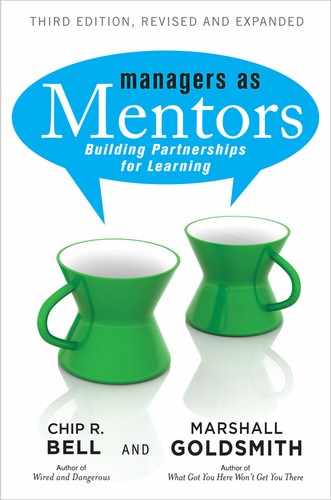Invitation # 2: Judgment-Free Communication
Anatomy experts tell us that courage occurs physiologically when the circuits in the thinking portion of the brain—the cerebral cortex—turn on and restrain or curb the overexcited emotional center of the brain. This means that rather than being emotionally stymied, clear thinking directs action even in the face of risks.
Mentors see the opportunities for collective exploration as chances to make good even better. Focusing on their role as the conveyor of wisdom, mentors have a confident view and see no minefields of emotional loss. However, protégés enter collective exploration looking up at a setting filled with the possibility for failure. In their mind’s eye they witness extremely foolish comments and grossly disappointing faux pas. They believe that somehow their hidden inadequacies—ones they view as massive—will suddenly be exposed and come under the disapproving scrutiny of a critical judge. Weighed by this exaggerated perception of reality, hearts race, memories halt, and the entire speaking apparatus is abruptly inoperative … and bone dry!
This is where nonjudgmental communication works as a magical antidote. Instead of a tone of censure, great mentors communicate the warmth of acceptance. An open posture replaces the cross-armed stare a protégé might anticipate. Their pace is slow and deliberate, not clipped and ambiguous. Gestures are invitational and affirming, not negative and tentative. Nonjudgmental communication uses nonthreatening expressions such as “What were your reasons for … ?” instead of “Why did you … ?”
Above all, nonjudgmental communication works by sending a friendly message that the protégé’s emotional armor is unnecessary and can be discarded. The key is to make the message an act of discovery—based on the idea that the protégé’s view is completely legitimate and normal, but also inaccurate. This is best done by refraining from commenting on the protégé’s nervousness directly. Instead, talk with the protégé as if anxiety were nowhere in sight. It is also important to use some self-effacing “I’m just like you” comments or examples. Mentor vulnerability is a powerful tool in dissipating protégé fear.
